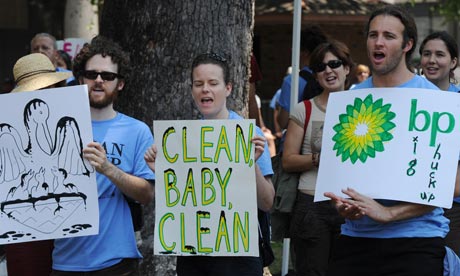Eiris review names Britain as 'dirty man of Europe'
Survey of Europe's top 300 companies reveals UK as worst offender in terms of corporate impact on global warming

Britain is being accused of being the "dirty man of Europe" after new research showed that, of the world's top 300 companies, more than half of those most engaged in carbon-polluting sectors were based in the UK.
A review of Europe's top 300 companies by the ethical investment consultant Eiris found that the greatest proportion of those with "very high impact" in relation to global warming came from the UK, more than double the number from any other country.
Of those companies in the top 300 dedicated to solving or mitigating the problems of climate change, only 3% were located in Britain. Eiris's findings come at a time when BP, one of the UK's best-known companies, has attracted bad publicity worldwide over the Gulf of Mexico oil spill.
A spokesman for Eiris said that its review was "worrying from a consumer point of view but also from an investment perspective". He added: "It is particularly alarming for pension funds and other long-term investors as climate change rises up the political agenda."
The greater exposure of UK plc to risk from climate change largely stems from the number of big oil and mining companies that dominate the FTSE 100 index in London.
Greenpeace said that the Eiris research was a "shameful" indictment of the UK, which had failed to build up a low-carbon business sector despite much political rhetoric.
Ben Stewart, a spokesman for the environmental campaign group, said: "It seems Britain is still the dirty man of Europe. These figures will shame the succession of ministers who promised Britain would be at the forefront of developing clean tech.
"As things stand, our economy is poorly placed to benefit from this century's inevitable shift to low-carbon industry, while Germany looks well-positioned to gain from first-mover advantage."
Eiris estimates that 41% of the top 300 companies in Britain and Europe have a significant impact on global warming, either directly from their operations or through the products they manufacture.
However, there was some good news to come out of the survey. More than 60% of companies with a high or very high impact on the environment have put in place measures under which executive remuneration is in some way linked to the company's carbon emission reductions.
More than half of all companies in the most polluting brackets have some kind of long-term carbon reduction targets in place, although Eiris notes that concrete action is harder to find.
French and German companies in the top 300 are at the forefront among those providing solutions to climate change. The consultancy does, however, point out that many British businesses may be excluded from the ranking because they are smaller.
In fact, the UK government has led initiatives to limit climate change, publishing the low carbon transition plan and introducing a carbon reduction commitment energy efficiency scheme, as well as a feed-in tariff scheme, promoting clean energy production in the home.

No comments:
Post a Comment